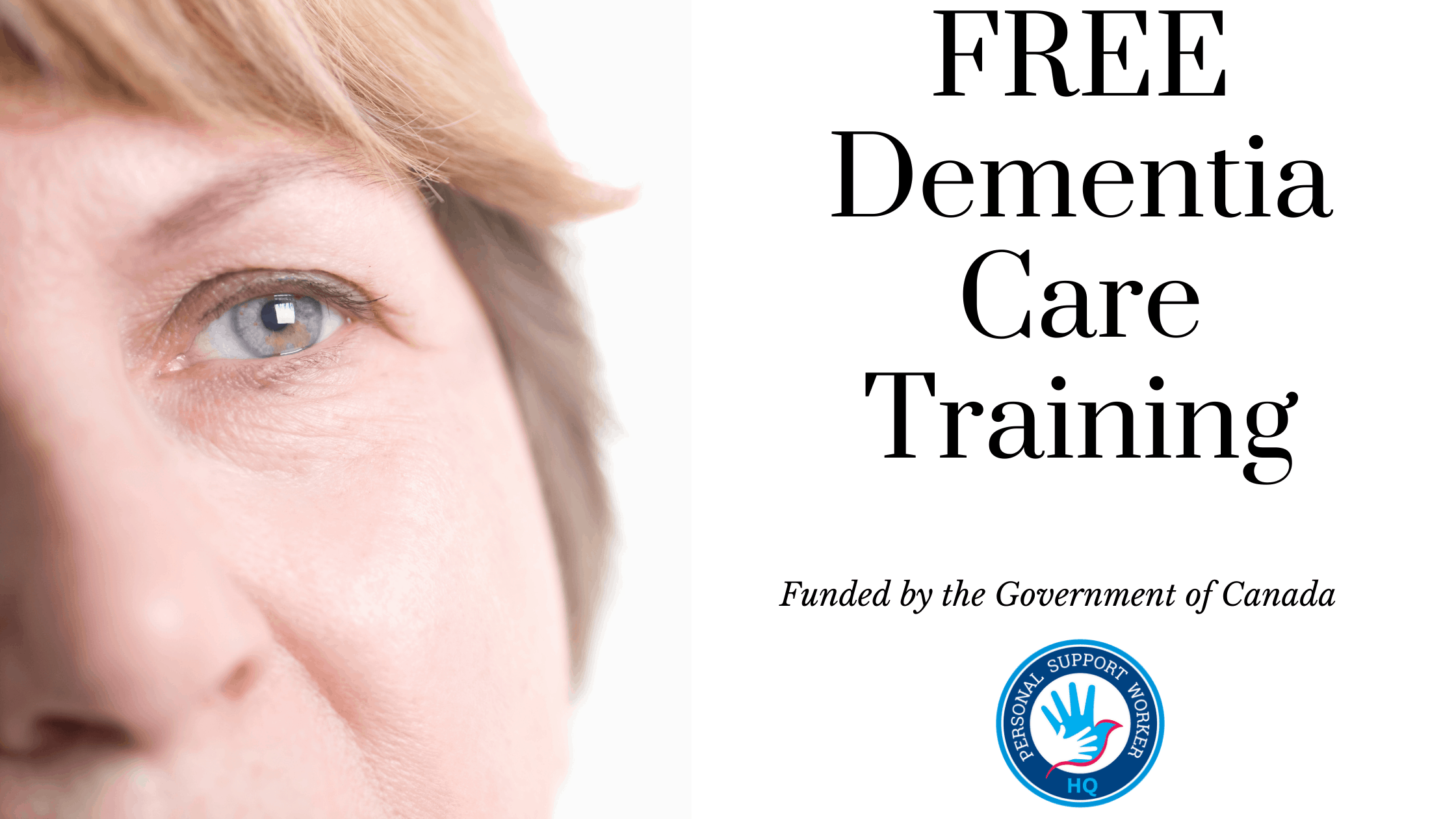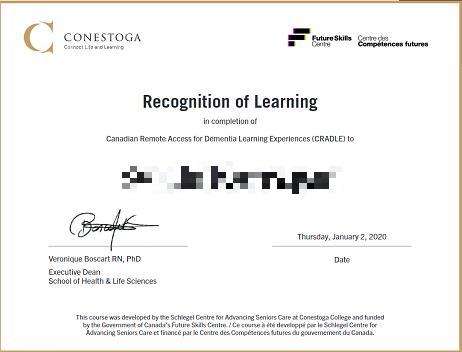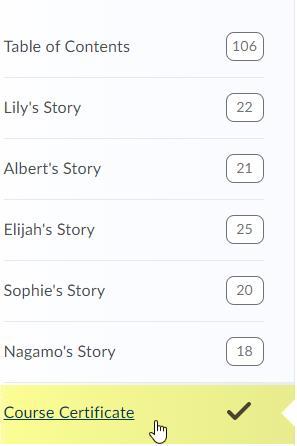
There are more than half a million Canadians living with dementia and the number is expected to double in the next 10 years.
What does this mean for you as a Personal Support Worker?
Well…
As a PSW, at some point in your career, you may be involved in the care of a person with Dementia.
Therefore, it is important for you to be aware of the principles of dementia care.
Dementia training should be an integral part of your ongoing learning.
While the Alzheimer’s Society of Ontario offers many free resources on dementia care, CRADLE is another platform that you can utilize to enhance your skills as a Personal Support Worker.
What is CRADLE?

CRADLE stands for the Canadian Remote Assess for Dementia Learning Experiences.
It is an online course specifically for Personal Support Workers to enhance their skills and knowledge in supporting seniors with dementia.
This is a FREE dementia care training program funded by Canada’s Future Skills Centre, an initiative of the Government of Canada.
With the help of Conestoga College, the CRADLE program is aimed at empowering unregulated care providers.
It is a completely online program and can be completed at your own pace from the comfort of your home.
You must complete the training by December 24, 2022.
The dementia training is specifically designed for you and is offered in multiple languages.
Who Is This Training For?
The training is specifically designed for Personal Support Workers and other unregulated care providers that work with individuals with dementia.
PSWs working in all care settings can take this free online course for dementia training and obtain a certificate from Conestoga College.
There are no pre-requisites for the training.
The Training Description
The course provides knowledge and evidence-informed training on person centred approaches to providing care to anyone with dementia and their care partners.
The course also gives you first-hand experience of five individuals living with dementia.
The dementia care training is divided into five modules.
Module 1
The first module focuses on Elijah’s story and explores the importance of each individual’s life story and the hidden meanings behind his/her actions.
In this module, you will learn the following:
- Explore the diverse needs of people living with dementia.
- The importance of getting to know the person you are caring for.
- A reflection on the care techniques to support the individual with dementia.
- Recognize the unique needs of the individual and understand your roles and responsibilities in the provision of dementia care.
Module 2
The second module focuses on Lily’s story and explores ways to prevent, identify and respond to situations of immediate concern for people living with dementia.
In this module you will learn the following:
- Signs and symptoms of delirium for a person with dementia.
- Signs and symptoms of stroke for a person with dementia.
- Identifying and responding to delirium for a person with dementia.
- A team approach to delirium for a person with dementia.
- Your roles and responsibilities while caring for someone with delirium and dementia.
Module 3
The third module focuses on Albert’s story and explores ways to recognize the individual needs of someone with dementia and device strategies to provide care.
In this module you will learn the following:
- The well-being of a person with dementia.
- Establishing meaningful connections from each individual’s story.
- A team approach to support the well-being of a person living with dementia.
- Your roles and responsibilities are to support meaningful connections and experiences while providing care to people with dementia.
After you have completed all the learning modules, you will be able to obtain your certificate from Conestoga College.
Module 4
The fourth module focuses on Nagamo’s story and explores ways to support a person and family’s end-of-life journey.
In this module you’ll learn:
- The principles of end-of-life care for a person and family living with dementia.
- The importance of personal preferences and cultural practices to support one’s quality of life.
- A team approach to support quality of life for a person and family living with dementia.
- Your roles and responsibilities to support an individual and his/her family in providing end-of-life care.
Module 5
The fifth module focuses on Sophie’s story and explores changes that can occur over time for a person living with dementia and the role of a team-based approach to providing quality care.
In this module you’ll learn:
- Learn about the changes that occur over time for a person living with dementia.
- The importance of adapting the approach to care according to the care recipient’s changing needs.
- A team approach to support a person and family living with dementia throughout their journey.
- Your roles and responsibilities in supporting a persona and family living with dementia.
How to Register
In order to access the online dementia training, you will have to register with D2L open courses.
Click here to register for Free dementia training with Future Skills Centre
Once you register, you will be able to access the course.
You can complete the course at your own pace.
How to Obtain Your Certificate
Once you have completed the dementia care training, you will be able to obtain your certificate of recognition.
The certificate is provided by Conestoga College.

Here are the steps you need to follow in order to obtain your certificate:
Step 1
Complete the five dementia care training modules.
Step 2
After you have completed the training in its entirety, you will see a new topic appear at the bottom of the list of topics in the left sidebar.

Step 3
Once you click on the “course certificate” you will be prompted to complete a quiz and acknowledge the completion of all modules of the course.
Step 4
After providing your acknowledgment, select “awards” from the top menu.
Step 5
Your certificate for the Canadian Remote Assess for Dementia Learning Experiences will be available for download.
You can also print your certificate.
Remember to include this dementia care training in your resume.
Resources you’ll need to become a Personal Support Worker
On this page, you can find anything there is to know about how to become a personal support worker, how to succeed as one, and how to continue your online education. This is the place to come to and look for all the PSW resources and information that you may need on your journey as a Personal Support Worker.
PSW job interview questions
If you’re determined to pass your next PSW interview with flying colors, we’re here to help. PSWHQ have put together a thorough online guide with PSW interview questions and appropriate sample answers to these questions that hit the target, and are concise and supportive.
Performing well in the interview is just one part of many others needed to secure a PSW Job. First and foremost, you’ll need to have an impeccable résumé and cover letter in order to be called for an interview.
Guide to finding PSW jobs
After you have decided to become a Personal Support Worker and completed the course you are now at a point to start looking for work. It is important that you explore all the jobs listed under different job titles, which is why you should go through our ultimate guide to finding PSW jobs.
We also help you find PSW job postings from hospitals, long-term care homes, and community and private settings.
Advertising with PSWHQ
Over the past few years, PSWHQ has achieved a dominant ranking in major search engines such as Google and Bing. As a result, we offer a limited number of advertising opportunities to individuals, colleges, companies, and organizations we see as a good fit for the unique audience of PSWHQ.
FAQs
1. What is CRADLE?
CRADLE stands for the Canadian Remote Assess for Dementia Learning Experiences. It is an online course specifically for Personal Support Workers to enhance their skills and knowledge in supporting seniors with dementia.
2. Are dementia patients entitled to free care?
There is no universal answer to this question, as the availability and extent of free care for dementia patients can vary from country to country. In some cases, patients may be entitled to free care if they meet certain criteria, such as being below a certain age or earning a low income. However, in other cases, patients may have to pay for all or part of their care themselves.
3. What is Dimentia?
Dementia is a neurological disorder that affects memory, thinking, and behavior. It is caused by damage to the brain. Symptoms can include memory loss, confusion, difficulty speaking or writing, mood changes, and problems with movement. There is no cure for dementia, but treatment can help improve symptoms.
4. What are good activities for dementia patients?
There are many activities that can be enjoyable for dementia patients. Some ideas include going for walks, listening to music, doing puzzles, or spending time with friends and family. It’s important to find activities that the individual patient enjoys, as this can help make them feel more engaged and stimulated.
5. Can a dementia patient be cared for at home?
Yes, a dementia patient can be cared for at home with the help of a caregiver. The caregiver can help with basic needs such as bathing, dressing, and grooming, as well as providing medication and reminders. The caregiver can also keep a close eye on the patient’s mental state and notify the doctor if there are any changes.








Please sign me up for the free dementia online course. What is the next step?
Rebalee…you can register for the training using the link under the “How to Register” section of the article above.
Avtar
Thank you for this! This is amazing! I am looking forward to the course!
Please signed me for Dementia care
Thank you so much
I am a dementia community coordinator working on a project to support people living with Dementia in rural Saskatchewan would this course help me in my role?
Hello, I tried to register for the dementia online course, but it is not accepting my first and last name or password.